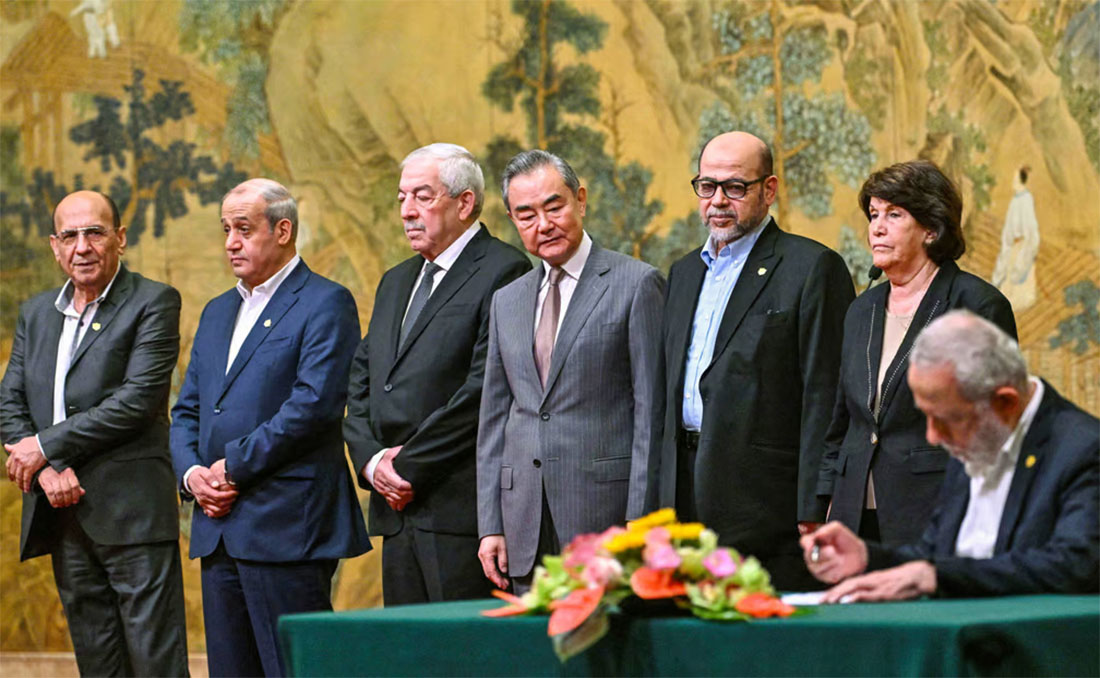
Photo Credit: Getty Images
Palestinian factions, including long-time rivals Hamas and Fatah, have signed an agreement to "end division and strengthen Palestinian unity" in Beijing, China announced on Tuesday. This significant development follows reconciliation talks hosted by China involving 14 Palestinian factions starting on Sunday.
Chinese Foreign Minister Wang Yi hailed the agreement as a commitment to the "great reconciliation and unity of all 14 factions," emphasizing the Palestine Liberation Organization (PLO) as the sole legitimate representative of all Palestinian people. He also mentioned that the factions had reached an agreement on post-Gaza war governance and the establishment of a provisional national reconciliation government.
The precise role of Hamas, which is not part of the PLO, in this arrangement remains unclear. These talks come amid ongoing conflict in Gaza, where Israel has vowed to eradicate Hamas following its October 7 attack on Israeli territory.
Fatah, which dominates both the PLO and the Palestinian Authority (PA), has historically been at odds with Hamas. The PA governs parts of the West Bank, while Hamas has controlled Gaza since 2007 after winning the 2006 legislative elections and expelling the PA from the strip. Previous reconciliation attempts, such as a 2017 agreement in Cairo, have quickly fallen apart due to violence and political disagreements.
Mustafa Barghouti, president of the Palestinian National Initiative and participant in the Beijing talks, stated that all parties had agreed to join the PLO, recognizing it as the only legitimate representative of Palestinians. Barghouti believes that the latest reconciliation efforts have made significant progress, driven by a unified front against Israel's occupation.
"The war in Gaza has prodded the factions to unite," Barghouti told CNN, adding that a new government would ensure the unity of the West Bank and Gaza, effectively blocking Israeli efforts to maintain its occupation of Gaza.
Despite these developments, some analysts remain cautious. Tahani Mustafa, senior Palestine analyst at the International Crisis Group, noted that major issues hindering past reconciliations were not addressed. She highlighted Palestinian Authority President Mahmoud Abbas's reluctance to share power as a significant obstacle.
Hamas delegation representative Mousa Abu Marzook confirmed an agreement to complete the reconciliation process, using the Beijing platform to defend Hamas's October 7 attack on Israel. Beijing has not condemned Hamas for this attack, instead positioning itself as a potential peace broker in the conflict.
China has been increasing its influence in the Middle East, presenting itself as a leading voice for countries decrying Israel's actions in Gaza and advocating for Palestinian statehood. Chinese leader Xi Jinping has called for an international peace conference and has dispatched a special envoy to the Middle East.
This agreement comes as Israeli Prime Minister Benjamin Netanyahu visits the US for talks with top officials and an address to Congress. The ongoing conflict in Gaza has resulted in the deaths of around 39,000 Palestinians and triggered a severe humanitarian crisis.
















